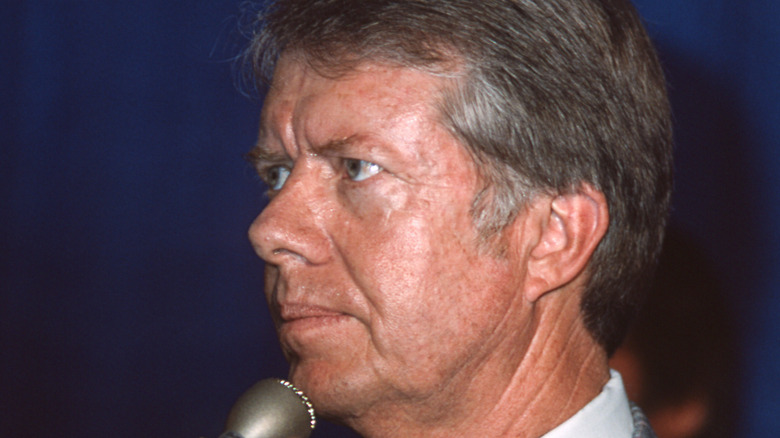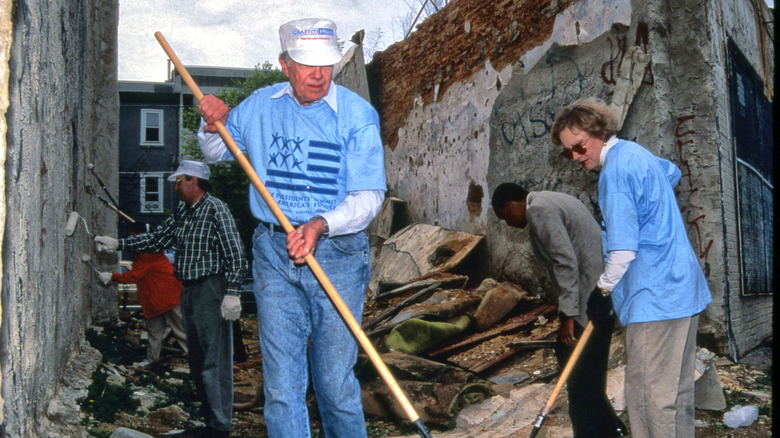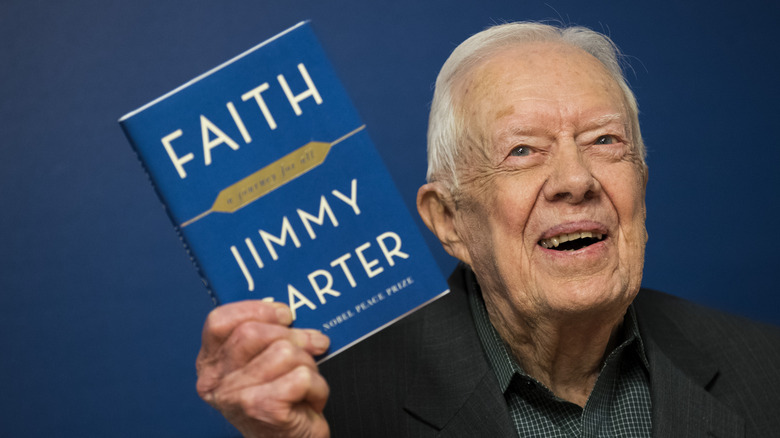The Truth About Jimmy Carter's Post-Presidency Life
A major question during the 1976 Presidential election was how a new commander-in-chief could possibly regain the trust of the American people. And that was something that the 39th President of the United States, Jimmy Carter, had to reckon with. With the memory of the Watergate scandal, the resignation of Richard M. Nixon, and the Vietnam War still in the back of people's minds, President Carter had to not only confront issues such as the economy and foreign relations but also an American public distrustful of Washington.
According to Britannica, President Carter sought to bridge the divide between the people and the president in a variety of ways. He held a high number of press conferences so the press could question him on his policies. He sought to use the Democratic-controlled Congress to pass many populist reforms. This became an issue, as the more traditional Democratic members of Congress considered Carter a populist, and so opposed many of his goals. His foreign policy fared better for a time, passing treaties with Panama, and the famous Camp David Accords with Egypt and Israel. However, his inability to free American hostages during the Iran Hostage Crisis, as well as continued inflation and the Three Mile Island meltdown all but tanked his presidency.
By the 1980 election, Republican Ronald Reagan won the presidency in a landslide. While Jimmy Carter's presidency is today seen as a failure by many people, as told by Biography, his life after Washington is an entirely different story.
Jimmy Carter became a humanitarian after his presidency
As told by Reader's Digest, many presidents spend their life after Washington enjoying their interests and hobbies, such as George W. Bush becoming a painter or Barack Obama going into film production. In the case of now-former President Carter, his retirement has largely focused on humanitarian efforts, and in a really big way. In 1982, Carter founded the Carter Presidential Center, which sought to focus on issues of human rights and democracy around the world. Along with his wife, Rosalynn Carter, former President Carter helped publicize the organization, "Habitat for Humanity," according to Constitution Center. Since 1984, the Carters have worked in 14 countries and helped build or renovate over 4,000 homes, Habitat for Humanity's official website notes.
Carter's organization, The Carter Center, has also worked hard to help eradicate Guinea worm disease, a very painful tropical illness people pick up by drinking water contaminated by the larvae of the worm. The center's efforts have paid off — in the past 30+ years, cases have plummeted from 3.5 million per year to only 13 in 2022 (via The Carter Center).
President Carter also used his name to work as a diplomat in foreign countries over the decades. According to Britannica, President Carter helped restored the homeland of the Miskito Indians in Nicaragua, established a short ceasefire between Bosnian Serbs and Muslims during the Bosnian War, reported illegal voting procedures in Panama, and negotiated an end to North Korea's nuclear program in 1994. He also oversaw the peaceful transfer of power in Haiti and attempted to mediate a settlement with the Eritrean People's Liberation Front. In 1999, President Bill Clinton awarded Carter the Presidential Medal of Freedom. Three years later, he was awarded the Nobel Peace Prize.
Jimmy Carter's Legacy Revived
Had Jimmy Carter decided to return to his Georgia farm after his presidency and spend his days relaxing, he would be viewed by history as an ineffective commander-in-chief and a transitional figure to the Reagan Administration. However, Carter's post-presidency life has changed his legacy in American history completely.
Al Jazeera reports that in 1981 as he was leaving office, President Carter had an approval rating of only 34%. President Carter's biographer, Jonathan Alter, had this to say about the change in Carter's legacy: "There is this historical reappraisal ... His accomplishments are seen better, and his failures are less remembered."
President Carter said of his administration, "We tried to keep the peace and we cherished our human rights." Others point to the behavior of Carter and compare it to former President Donald Trump as a reason for the canonization of Carter. Presidential historian Douglas Brinkley said, "Trump lied with such stark regularity. Carter's calling card was bedrock honesty. So the difference between the two men could not have been greater."
Despite recent health problems, such as suffering a broken hip and multiple cancer bouts, according to Biography, President Carter became the longest-lived president at 94 years and 172 days on March 21, 2019.


